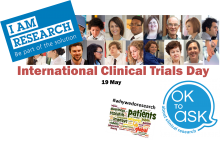
International Clinical Trials Day - Raising awareness of the benefits of research
Each year, on International Clinical Trials Day (ICTD), HSC R&D Division and its HSC partners highlight that it’s ‘OK to ask’ about clinical research.
'OK to ask' is about encouraging patients, carers and the public to ask their health professional about research opportunities that might be available to them and remind health and social care professionals to be research aware. (Please look below for ways to support the campaign)
This year we would also like to give patients, the public and health and social care research professionals a chance to shout about how fantastic research is and the positive impact it has on peoples lives. In the last five years, 25,000 HSC service users in Northern Ireland have helped improve healthcare and develop life-saving treatments by taking part in health and social care research. This research drives new and better treatments.
Here are a few stories from our PPI representatives, and healthcare professionals we fund about their experiences of research:
 |
I am Aidan, I have an extremely rare and aggressive bone wastage disease. After being involved in a clinical trial my life has changed massively, I am fitter, stronger and healthier than ever before in my life. Being involved has given me a far better quality of life that I could of only dreamed of, I used to worry about the future and how fast I was deteriorating. Not now the future is bright and I have hope which I never had before, Research did not just change my life it saved my life. |
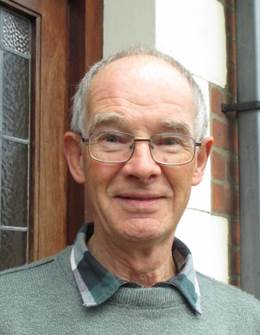 |
Gordon tells his story …. My wife Phyllis was diagnosed with Alzheimer’s disease over 20 years ago. This led to Phyllis being invited to participate in the clinical trial of a drug called Aricept, the first possible drug treatment for the disease. Phyllis went on to participate in further research projects into the illness. One such project, funded by the Alzheimer’s Society involved a newly formed Volunteer Research Network made up of people either with dementia, or who have direct experience of caring for people with dementia. I joined this Network , which was set up to prioritise the aspects of the disease which the Society should be funding, score grant application lay summaries, sit on appointment panels and monitor successful research proposals. This was the beginning of a 15 year journey for me as a lay participant in dementia research, a journey which I have found to be both enlightening and personally rewarding. It has also led me into a broader Personal and Public Involvement (PPI), involving the Health & Social Care R&D Division PPI steering group. That too has been a privilege, in sharing and learning how properly implemented PPI can be of real benefit not only to the users, but also to the researchers, as they seek to find cures and at the same time, improve the care and treatment of all users of the Health Service. One very positive development of the PPI role has been in meeting with researchers at the formative stage of their research proposals. People with the specific illness being studied, and those caring for them, have unique insights and experiences which, if tapped into, can enable researchers to better focus and develop their projects, thus leading to better research and better outcomes. Recently I participated in the public announcement of the Join Dementia Research register, which has been set up in Northern Ireland to enable more people to participate in clinical trials. Research is an exciting journey with new technologies enabling new discoveries and insights to be made across a broad range of disciplines on an ongoing basis. As a lay person, it has been my privilege over the last 15 years to participate in some small way in that journey. |
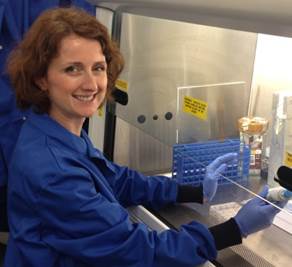 |
Researchers in QUB have developed a lung perfusion system which uses human lung cells and whole human lungs. These lungs have been donated for medical research by patients who have died. This system allows researchers like Dr Marianne Fitzgerald to study possible procedures which might reduce lung injury and promote repair of the lining of the lung without causing susceptibility to infection. It is hoped that this work could help identify safe new treatments for Acute Lung Injury (ALI), a devastating condition, common in Intensive Care patients, where fluid leaks into the lung because the lung lining becomes damaged. Currently there is no cure for ALI, and up to 50% patients die. |
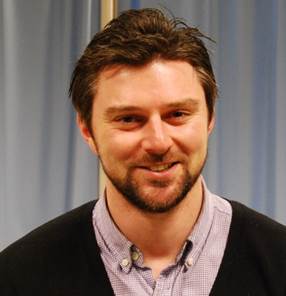 |
A clinical trial involving 70 children looked at different X-ray imaging methods and what effect they had on the quality of the pictures they produced as well as any risk to children's health. Dr Richard Gould, a radiographer in the Belfast HSC Trust undertook this research which showed that it is possible to reduce the amount of radiation children receive during X-rays of their heart, and this can be done without affecting the quality of the test. Richard’s findings are important for children’s health and have identified optimal techniques for X-ray imaging in children. Without the children and their families who took part, this research would not have been possible. |
 |
Dr Helen Kerr, winner of the 2017 International Journal of Palliative Nursing ‘Researcher of the Year’, is working to identify the key factors that contribute to an effective transition from children’s to adult services for young adults with life-limiting conditions. Services users and providers have been central to this work. Young adults, parents and carers as well as service providers in the statutory and non-statutory sector were involved in the research, and Helen is now working with 80 services users and service providers to develop a priority action plan based on the findings. |
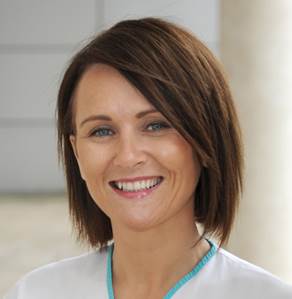 |
Prostate Cancer is the most common cancer in men in the UK with around 1000 men diagnosed in Northern Ireland each year. We know that radiotherapy is an effective treatment for prostate cancer but often surgery is needed to insert “markers” into the prostate so that the doctor knows the precise position of the prostate during the treatment. Unfortunately the surgery can sometimes cause pain, bleeding and infection. Angela O’Neill, a Therapeutic Radiographer in the Northern Ireland Cancer Centre is researching a new imaging technique for Prostate Cancer to look at whether it is possible to use different images of the prostate, which show naturally occurring changes, to precisely locate the prostate and use this to plan the treatment. Angela will be recruiting up to 60 men to this study and if this new imaging works it will benefit patients by reducing the need for a surgical procedure while ensuring maximum treatment accuracy. |
The National Institute for Health Research (NIHR) in England is also raising awareness of the benefits of research and the positive impact it has on people's lives through its new campaign called "I am research" . Click on the link to find out more and also join the Thunderclap!
Although there's not always a research study to suit everyone, there are other ways to be involved or stay in touch. This could be as a PPI Representative advising researchers on improving patient experiences, looking at studies coming on to the UK Clinical Trials Gateway or by signing up to Join Dementia Research. You could also sign up for our mailings, or simply talk about research.
All members of health and social care teams can also help patients take part in healthcare research - every healthcare professional should be a researcher; knowing about what research is taking place in their area, displaying information on research and encouraging patients to ask about taking part in research.
You can support the 'OK to ask' campaign by:
-
Asking your HSC professional about research for you or someone you care for
-
Holding your own event and sending us your photos (download 'OK to ask' poster)
-
Contacting us using social media (see the 'OK to ask' leaflet)
-
follow updates on Twitter @publichealthni using #HSCok2ask when Tweeting
-
follow updates on www.facebook.com/publichealthagency
-
Contacting us by email at ok2ask@hscni.net and telling us: that you asked for information; what response you received; about your experience of taking part in research; any additional comments.
The useful links below provide more information about what research is and how you can be involved:
- UK Clinical Trials Gateway - find out what research is happening near you
- Patient Stories - hear from the patients involved (NIHR website)
- Our People - hear from health professionals involved (NIHR website)
- Blogs - read about personal research experiences (NIHR website)
- Learn about research on our free online course (Future Learn website)
- Join Dementia Research
- Find out more about active public involvement in health and social care research

